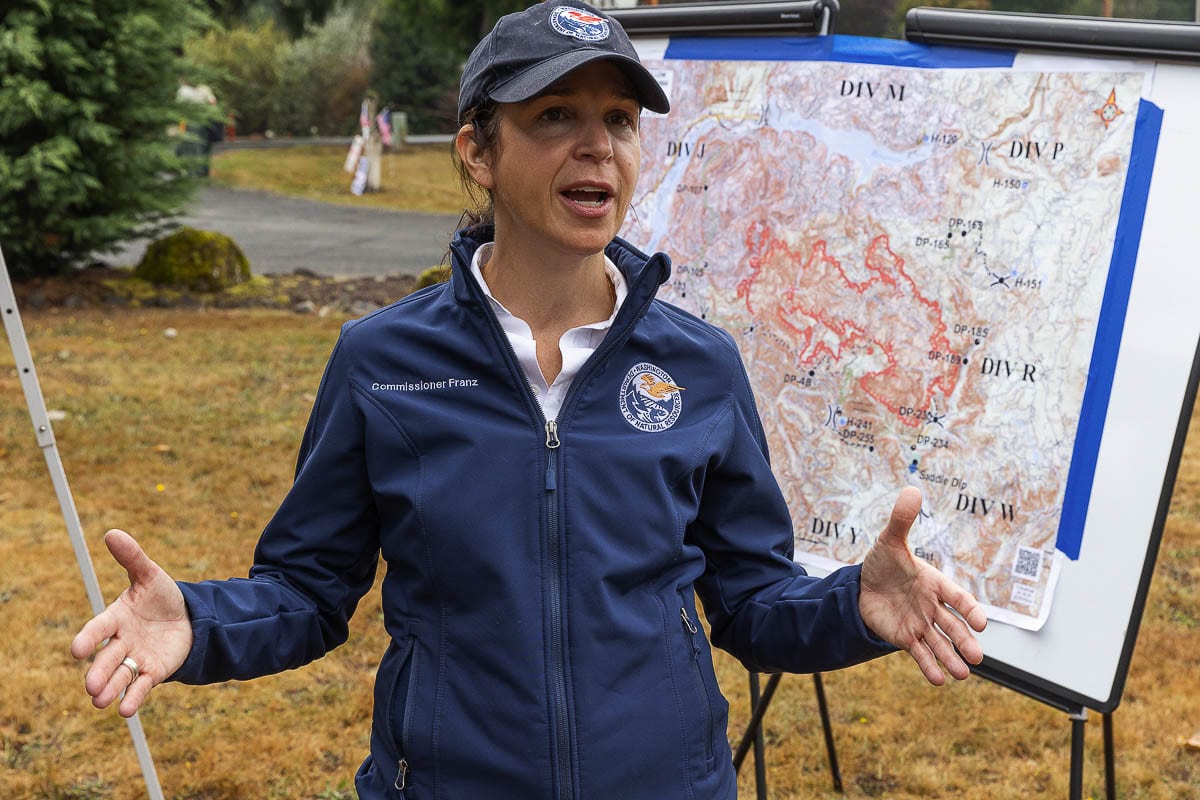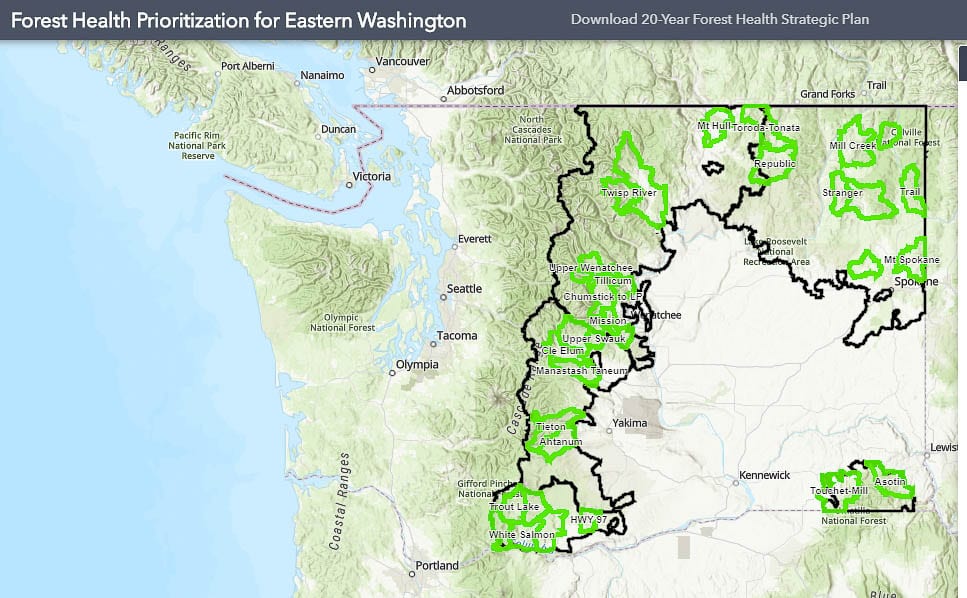Clark County Today goes one-on-one with Washington Commissioner of Public Lands Hilary Franz
After her press conference last Friday at Amboy Territorial Days Park where she updated area residents on the Big Hollow Fire that was threatening homeowners in both Cowlitz and Clark counties, Washington Commissioner of Public Lands Hilary Franz explored sources of providing the revenue she says her organization needs to better manage our public lands.

In a 20-minute interview with Clark County Today, Franz spoke about needing resources to fight fires and the prevention of large fires by restoring forests to good health.
Franz was elected to office in 2016 and she is running for reelection in November’s general election. Prior to her election, she was a member of the Bainbridge Island City Council. She has been a Seattle attorney and former executive director of the sustainable development advocate Futurewise.
Franz mentioned 20 to 50 years of past forest management as leaving too much tinder and sick trees in our forests to catch fire. “We have just in central Eastern Washington, 2.7-million acres of forests that are dead and dying that are literally tinder boxes,” she said.
The Board of Natural Resources sets policies for the state Department of Natural Resources (DNR) and approves the agency’s 10-year sustainable harvest plans. They determine how much timber is to be sold from trust land. The state has fallen behind in harvesting timber according to a Nov. 2019 Crosscut report.
“Under the 2004-2015 plan, the goal was to harvest 5.5 billion thousand board feet of timber (MMBF). However, that target was missed by roughly 460 MMBF – more than the total timber harvested from state trust land in 2015. According to DNR Uplands Deputy Supervisor Angus Brodie, it’s one of the largest arrearages in decades.”
Franz previously proposed a 20-year plan to clear forests. “Our forest health plan has us treating 70,000 acres a year over the next 20 years for 1.25 million acres,” she said on Friday. “Half of that is federal land because they are the most significant landscape that is at risk and has the most significant dead diseased trees.”
Franz emphasized that “we have got to get on those forests, federal, state, tribal and private, and start to restore the resiliency; remove the dead diseased trees, the smaller diameter (trees), get more spatial gaps between those trees so they aren’t competing for soil, moisture, nutrients.”
As head of our state’s Department of Natural Resources, she supervises 1,500 employees, directs the management of 5.6-million acres of state-owned lands, supervises DNR’s wildfire protection on millions of acres of state and private forest land.
Franz said she has 73 full-time firefighters; a 70 percent increase from 2016. “When I came into office in this position, we only had 43, so we were able to add 30 more thanks to the legislature’s leadership.” Her agency also has 550 seasonal firefighters. Franz said: “I have 1,500 employees and half are trained for fires.”
Franz oversees three million acres of state trust lands that provide sustainable non-tax revenue for state and county services and public school construction projects. Her agency provided $325 million in revenue to the state each year, one of the rare government agencies that generates money. Those funds mainly go to support schools and also counties, according to Franz.

Franz was asked by Clark County Today if she would prefer to self-fund the acquisition of all those resources she needs by keeping more of the money her agency generates.
“The money that we generate from the management of those lands, whether it’s timber, ag (agriculture) or other use, goes directly towards funding our schools, if it’s school trust lands, or our counties, if it’s county land,” she said. “We are obligated by state law and the Constitution that that money has to go to their benefit.”
Regarding the money her agency generates for the state, Franz said her agency gets a management fee of around 25 percent. That varies depending on if it is a land sale, or a timber harvest, or grazing rights.
Franz was asked if she would like more autonomy from the Washington State Legislature. Would she like to keep more of the revenue her agency generates, to make the investments that are needed; to buy the equipment, the planes and fire engines, and to hire the personnel? If she could keep more of that revenue her agency is already generating, then Franz would be more in control, instead of having to ask the legislature every two years.
“I think right now our counties and schools need money more than ever before,” she said. “Taking from that revenue that is generated from those lands and putting it to wildfire protection is not the right focus. They need that revenue more than ever before. They’re stretched even thinner than they ever were before, with COVID and other challenges.’’
Franz was asked if she would consider allowing more timber harvests and put more lands up for grazing, in order to generate additional revenues, and allowing her agency to be less reliant on the whims of politicians.
Clark County Today asked: “If you could put up an extra 5 percent of lands for harvesting, for grazing, you’re not taking away from the schools and the other resources the legislature’s already allocating. But if you could keep 50 percent of all that revenue that you generated by putting up additional lands, for harvesting or for grazing, that would give you new money to then invest in what you say you need and you’re not taking from others. Is that a possibility?”
“We should be opening up as much of our lands for grazing or ag production as possible,” she said. “But I would continue to put that money into making those lands more resilient and generate more money for the schools and the counties.
“I think the legislature along with me, has to work to get the resources for wildfire. And I’m working at the federal level, because Congress is huge,” said Franz, who spoke about working with Alaska Senator Lisa Murkowski and federal agencies to get more funding from the federal government.
Clark County Today then asked Franz: “It sounds like the biggest, more immediate help would be federal because you don’t see the ability because of other demands in the state for you to get any more state revenue.”
“We’ve got to do our part,’’ said Franz, referring to the state. “We can’t just trust that the feds are going to have those resources for us.
“I believe the state needs to step up,” she added. “Not much has happened in Congress in a long time, although the Land and Water Conservation Act (passed in 1964) was a huge win, but it was unprecedented given their track record over the last 5-10 years. If we are basing our destiny and future on the federal government solving it, we’re again putting our lives truly our lives in the hands of someone else. We have the ability to control ourselves and control our destiny by investing where we need to in the forest resilience, in the community resilience and wildfire resources.”
In October 2018, Franz made the largest budget request of its kind in state history: a $55-million Department of Natural Resources proposal for fighting wildfires and maintaining healthier forests in Washington, according to a news report. Among other things, it would convert 30 seasonal engine captain jobs into year-round permanent positions
Earlier this year, Franz asked the legislature to create a new source of revenue for her agency, KGW news reported at the time. The bill, which later failed, was introduced in the state House of Representatives by Rep. Joe Fitzgibbon (West Seattle). Her proposal would provide $63 million each year to fight wildfires and take steps to prevent them. The bill would be the largest investment Washington has ever made to expand its wildfire team and restore the health of forests, the commissioner’s office said.
Money for the fund would have come from a $5 surcharge each year on home and auto insurance policies, according to a Wenatchee World news report. Franz estimated it would cost the average household just over $1 per month, based on one homeowner’s policy and two auto policies.
The bill is different from a more complicated 2019 bill that failed to pass, in that the 2020 legislation contains a flat surcharge on insurance policies, Franz said.
At the time, Senate Minority Leader Mark Schoesler (Ritzville), criticized the bill as a bad idea.
Schoesler said the proposal would dramatically raise costs for farmers and small business operators who own substantial property.
Schoesler said the state needs to do a better job of managing forests and fighting fires. “We’re being asked to pay taxes to support management that is not good,” Schoesler told the Associated Press.
The new money would pay for 42 new full-time firefighters, 15 fire engine leaders and trucks, a helicopter, and various efforts to prevent wildfires in the first place, Franz said.
Sen. Kevin Van De Wege (Sequim) supported the bill. “That kind of strategy requires a stable revenue source,” he told The Associated Press.
A February 2020 report from the DNR indicated timber revenues for the 2019-2021 biennium are forecast to remain at $345 million, while revenues for the 2021-2023 biennium are increased by $0.2 million to $353 million.




